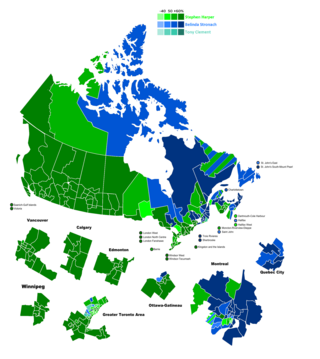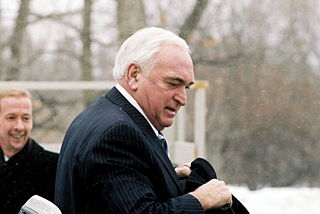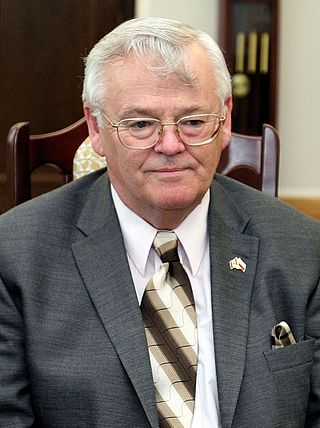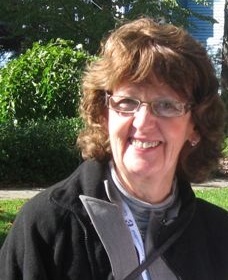
The Canadian Alliance, formally the Canadian Reform Conservative Alliance, was a centre-right to right-wing federal political party in Canada that existed under that name from 2000 to 2003. The Canadian Alliance was the new name of the Reform Party of Canada and inherited many of its populist policies, as well as its position as the Official Opposition in the House of Commons of Canada. The party supported policies that were both fiscally and socially conservative, seeking reduced government spending on social programs and reductions in taxation.

The Progressive Conservative Party of Canada was a centre to centre-right federal political party in Canada that existed from 1942 to 2003.

Allan Joseph MacEachen was a Canadian politician and statesman who served as a senator and several times as a Cabinet minister. He was the first deputy prime minister of Canada and served from 1977 to 1979 and 1980 to 1984.
The Unite the Right movement was a Canadian political movement which existed from around the mid-1990s to 2003. The movement came into being when it became clear that neither of Canada's two main right-of-centre political parties, the Reform Party of Canada/Canadian Alliance (CA) and the Progressive Conservative Party of Canada (PC), was independently capable of defeating the governing Liberal Party. The objective of the movement, therefore, was to merge the two parties into a single party. The goal of uniting the right was accomplished in December 2003 with the formation of the Conservative Party of Canada.

The 2004 Conservative Party of Canada leadership election took place on March 20, 2004, in Toronto, Ontario, and resulted in the election of Stephen Harper as the first leader of the new Conservative Party of Canada. The Conservative Party was formed by the merger of the Canadian Alliance and the Progressive Conservative Party of Canada, in December 2003.
Lowell Murray, is a former Canadian senator and long-time activist with the federal Progressive Conservative Party.

His Majesty's Loyal Opposition, or simply the Official Opposition, is usually the second-largest party in the House of Commons. Typically, it is the largest party of the parliamentary opposition, which is composed of members of Parliament (MPs) who are not in government.

The 34th Canadian Parliament was in session from December 12, 1988, until September 8, 1993. The membership was set by the 1988 federal election on November 21, 1988, and it changed only somewhat due to resignations and by-elections until it was dissolved prior to the 1993 election.

John Douglas Reynolds is a former Canadian politician. He was the member of Parliament for the riding of West Vancouver—Sunshine Coast—Sea to Sky Country in the House of Commons of Canada from 1997 to 2006 and a former Federal Opposition Leader. He had also been an MP in the 1970s as well as a provincial politician in British Columbia in the 1980s and 1990s.
Jacques Flynn was a Canadian lawyer and federal politician, serving in both the House of Commons and Senate.

Noël Augustus Kinsella was a Canadian politician and was speaker of the Senate of Canada from 2006 to 2014.

The 32nd Canadian Parliament was in session from April 14, 1980, until July 9, 1984. The membership was set by the 1980 federal election on February 18, 1980, and it only changed slightly due to resignations and by-elections prior to being dissolved before the 1984 election.

The 33rd Canadian Parliament was in session from November 5, 1984, until October 1, 1988. The membership was set by the 1984 federal election on September 4, 1984, and it only changed slightly due to resignations and by-elections prior to being dissolved before the 1988 election.

Marjory LeBreton is a Canadian former leader of the Government in the Senate of Canada; a member of the Canadian cabinet; and past national chair of Mothers Against Drunk Driving in Canada. She worked with four leaders of the Progressive Conservative Party of Canada - John Diefenbaker, Robert Stanfield, Joe Clark and Brian Mulroney - from 1962 to 1993 before being appointed to the Senate on the advice of Mulroney. She sat as a Progressive Conservative Senator from her appointment until moving with most of her caucus colleagues to the new Conservative Party of Canada in 2004, of which she was soon elected to Chief Whip. She served as an advisor to then opposition leader Stephen Harper during the 2006 election, which the Conservative Party won. After the election, she was named to the cabinet position Leader of the Government in the Senate. On July 4, 2013, LeBreton announced she would not continue in the position as of the next cabinet shuffle, which occurred later that summer. She retired from the Senate upon reaching her 75th birthday on July 4, 2015.

Pierre Claude Nolin was a Canadian politician and senator. A prominent member of the Conservative Party of Canada from 2004 until his death, he became an influential figure in the Party's parliamentary caucus.
Jean-Claude Rivest is a Canadian lawyer, former politician and Senator.
David Tkachuk is a Canadian teacher, executive and politician. Tkachuk was a member of the Senate of Canada, representing Saskatchewan from 1993 to 2020.
Gerald Ryan Ottenheimer was a Canadian politician and Senator.

This article is the Electoral history of Brian Mulroney, the eighteenth Prime Minister of Canada.

This article is the Electoral history of Kim Campbell, the nineteenth Prime Minister of Canada.











